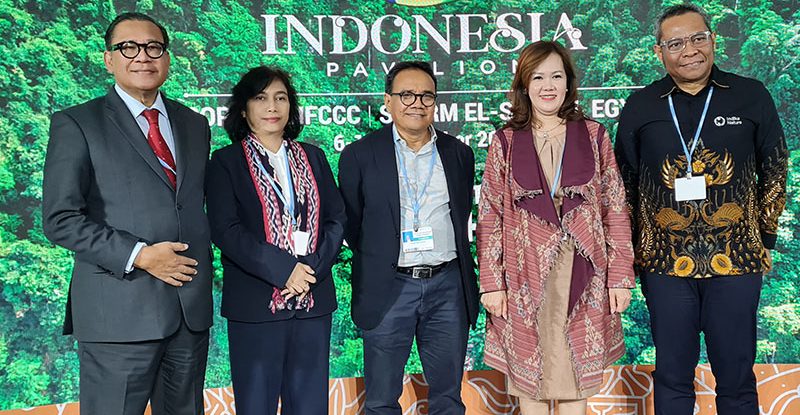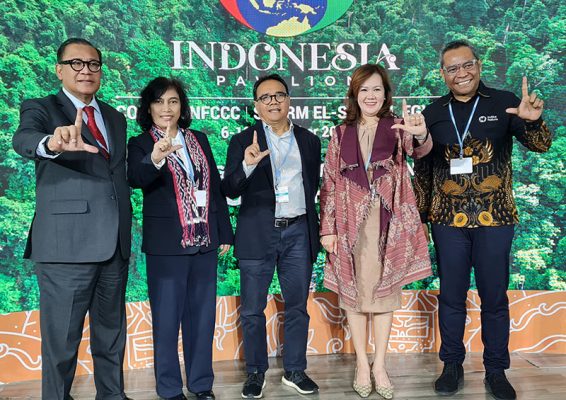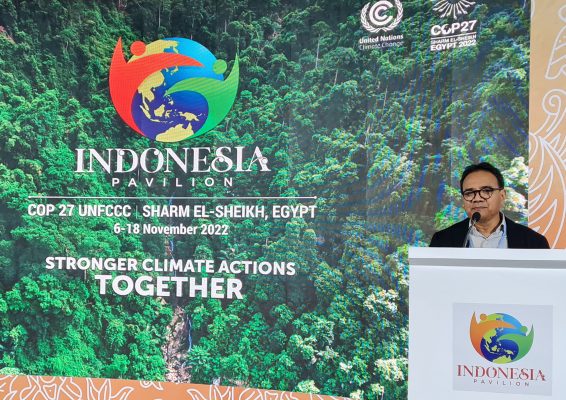
Two events at COP27’s Indonesia Pavilion called on businesses to play a greater role in meeting the country’s Nationally Determined Contributions (NDCs). Speakers especially focused on reducing emissions from the Forest and other Land-use (FoLU) sectors, which account for almost 60 percent of Indonesia’s greenhouse gas (GHG) emissions.
“Efforts to achieve Indonesia’s emission reduction targets — as have been committed under the NDCs — cannot be carried out by the government alone,” said Haruni Krisnawati, Research Professor at the Ministry of Environment and Forestry. “We will learn from the private sector, scientists, NGOs and local communities to reach collective goals for climate change mitigation and adaptation.”
WATCH THE SESSIONS:
- Achieving Net Zero Emission: A High Call for Urgency from a Business Perspective (1:23:58)
- Pursuing Indonesia’s FoLU Net Sink target by 2030: How can businesses and farmers contribute and benefit? (7:08:30)
New Targets, New Plans
These conversations at the Indonesia Pavilion are happening in the context of the country’s updated NDC-2030 targets (2022), which commit to reducing GHG emissions by 33.89 percent compared to what they would be under business-as-usual circumstances (unconditional target) and by 43.20 percent if they receive international support (conditional target). Indonesia has also committed to an updated NDC that is aligned with its Long-Term Low Carbon and Climate Resilience Strategy (LTS-LCCR) 2050 and aims to achieve net-zero emissions by 2060 or earlier.
Because most of Indonesia’s GHG emissions come from forestry and land-use activities, transitioning to sustainable land management is key to achieving the NDC targets. The government’s Forest and Other Land Use (FoLU) Net Sink 2030 Operational Plan sets out technical guidelines for this transition. The Plan will work to realize higher GHG absorption than emission levels across Indonesia’s land areas (i.e. a net sink by 2030).
Significantly, FoLU does not include guidelines for agricultural emissions, noted Daniel Murdiyarso, Principal Scientist at the Center for International Forestry Research and World Agroforestry (CIFOR-ICRAF). However, Murdiyarso went on to suggest that both FoLU and agricultural-based emissions should be integrated in the Indonesian climate strategy, as they happen on the same landscape. The integration would avoid leakages.
“The achievements we’ve made so far are very promising, but there are less than 30 years to 2050,” he said. “…I think public money alone is not enough to solve the climate crisis. This is a global issue, and the private sector [including agribusiness] should play its role.”
Bringing big businesses on board
While governments and scientists are necessary to strengthen policies (like those mentioned above) and enhance data transparency, businesses can help jump-start a circular bioeconomy by improving their production efficiency and shifting to low-carbon technologies. Incentives (e.g. tax credits, permits, green investments and carbon credits) are one way for the government to get businesses on board with these plans, according to Krisnawati.
Representatives from Sinar Mas Group and Indonesia’s Chamber of Commerce (KADIN) spoke at the Pavilion about the actions they are taking to mitigate and adapt to climate change.
Notably, KADIN’s Net Zero Hub Initiative is bringing together more than 100 Indonesian companies who pledge Net Zero transitions. The Hub will support businesses with toolkits, guidelines and resources. It is also a platform to facilitate dialogue between industries, scientists and policymakers at the national and international levels.
Sinar Mas’s representatives spotlighted the company’s Science Based Target Initiatives (SBTis), which are aligned with Paris Agreement goals and verified by a third party. During the first event, for example, Elim Sritaba, the Chief Sustainability Officer of Asia Pulp and Paper (APP) Sinar Mas, projected an 80 percent decrease in the company’s carbon emissions by 2050 if the group adopts certain practices. During the second event, Agus Purnomo, Senior Sustainability Advisor at Sinar Mas Agribusiness and Food, further highlighted the company’s initiative to conserve 79,900 ha of High Conservation Value (HCV) forests within palm oil concessions.
“If [Indonesian businesses] don’t implement these changes, we will be left behind,” said Silverius Oscar Unggul, Deputy Chairman for Environment and Forestry, KADIN. “In our decision to support our government, we’ll do all we can to make net zero a target of our nation.”
Smallholders and sustainability
Achieving the NDCs is not only about working with big businesses. Small industries matter too.
COVID-19 led to a rapid increase in the number of smallholders, noted Musdhalifah Mahmud, Deputy Minister for Food and Agriculture, Coordinating Ministry of Economic Affairs. As work dried up in the city, people returned to their villages to farm or engage in other small industries. The result has been increased emissions from land-use activities and an understanding that Indonesia cannot achieve its NDCs without also collaborating with smallholders.
One way that governments can support farmers is by helping them increase yield efficiency, suggested Mahmud, Big business such as Sinar Mas produce three to five times as much palm oil per hectare as smallholders, meaning they need to disturb less land to achieve the same result. To bridge the production gap, government initiatives can make it easier for smallholders to buy high quality seeds and access low-interest financing.
“If smallholders’ can increase their yields without having to increasingly cut the forests, this is a good thing,” she said.
The national government has also called on big businesses to practice Corporate Social Responsibility (CSR) by working with local villages and communities to manage land sustainably.
For example, Sinar Mas’s CSR program is already working on participatory supply chain mapping with smallholders in 171 villages. Additionally, Purnomo advertised their ongoing efforts to conserve 43,000 ha of forests through Protection-Production Partnerships with 100 local communities.
The science
Underlying all successful partnerships between businesses, governments and communities is strong science, emphasized Haruni and Murdiyarso. In particular, monitoring, reporting and verification systems (MRVs) will help keep Indonesia’s plans on track in the coming decades. However, MRVs are still challenging to implement due to the lack of data consistency and training workshops on area-specific conservation.
With ongoing support from public-private partnerships, the two sessions called on scientists and supporting NGOs — including CIFOR-ICRAF — to continue acting as support pillars for policymakers in Indonesia.
“As scientists, we are helping to answer the question, ‘how can nature be part of the economic solution?’” said Murdiyarso.
We want you to share Forests News content, which is licensed under Creative Commons Attribution-NonCommercial-ShareAlike 4.0 International (CC BY-NC-SA 4.0). This means you are free to redistribute our material for non-commercial purposes. All we ask is that you give Forests News appropriate credit and link to the original Forests News content, indicate if changes were made, and distribute your contributions under the same Creative Commons license. You must notify Forests News if you repost, reprint or reuse our materials by contacting forestsnews@cifor-icraf.org.

